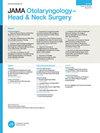Sinus histiocytosis with massive lymphadenopathy.
引用次数: 23
Abstract
Sinus histiocytosis with massive lymphadenopathy (SHML) is a newly recognized, distinct, pseudolymphomatous benign entity with very characteristic microscopic features. Most patients are children or young adults with massive painless cervical adenopathy, although other node groups and extranodal sites often are involved. Sixteen patients with SHML involving the upper respiratory tract and/ or salivary gland are presented. Nine of the patients had ear, nose, and throat (ENT) manifestations at the time of presentation. In most cases the ENT involvement resulted in prominent clinical symptoms. Treatment included surgery, antibiotics, irradiation, chemotherapy, and steroids, frequently in combination, but no consistent pattern of response emerged from the study. These 16 patients were very similar clinically to patients with SHML who did not have ENT disease, indicating that extranodal involvement is not associated with more aggressive disease.窦性组织细胞增生伴大量淋巴结病。
窦性组织细胞增生伴大量淋巴结病(SHML)是一种新发现的、独特的、良性的假性淋巴瘤,具有非常独特的显微镜特征。大多数患者为大量无痛性宫颈腺病的儿童或年轻人,尽管其他淋巴结组和结外部位也常受累。本文报告16例累及上呼吸道和/或唾液腺的SHML患者。9例患者在就诊时有耳鼻喉(ENT)表现。在大多数情况下,耳鼻喉受累导致突出的临床症状。治疗包括手术、抗生素、放疗、化疗和类固醇,经常联合使用,但研究中没有一致的反应模式。这16例患者的临床表现与没有耳鼻喉疾病的SHML患者非常相似,表明结外累及与更具侵袭性的疾病无关。
本文章由计算机程序翻译,如有差异,请以英文原文为准。
求助全文
约1分钟内获得全文
求助全文

 求助内容:
求助内容: 应助结果提醒方式:
应助结果提醒方式:


